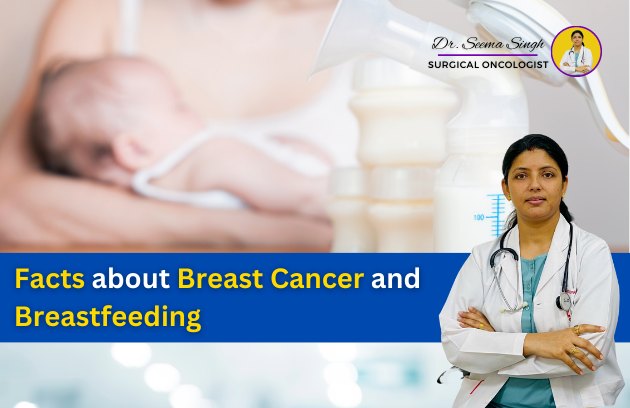- July 18, 2023
- Dr Seema Singh
- Comment: 0
- Breast cancer
Is Breast Feeding Safe during Breast Cancer?
Can Breastfeeding Help Lower the Risk of Breast Cancer?
Breast cancer is a complex condition influenced by various factors, many of which we are not under control. But did you know that breastfeeding may have a positive impact on reducing the risk of developing breast cancer? It’s true! Scientific studies have shown that reproductive factors, like breastfeeding, can play a role in protecting women against this disease.
So how does breastfeeding help? Well, when a woman breastfeeds her baby, it often leads to a delay in the return of her menstrual cycle. This delay means less exposure to estrogen, a hormone that can sometimes contribute to the growth of breast cancer cells. The longer a woman breastfeeds, the lower her risk of breast cancer may be.
Can You Develop Breast Cancer While Breastfeeding?
Breastfeeding is a wonderful experience for both mother and baby, but it’s essential to be aware that women can still develop breast cancer while breastfeeding or pumping milk. In fact, some women may notice changes in their breasts during this time, making it even more important to recognize any potential warning signs.
It’s quite common for a breastfeeding woman’s breasts to feel lumpy due to milk production or blocked milk ducts. However, if you notice a lump that doesn’t seem to go away even after a week, it’s crucial to have it checked by a healthcare professional. While it’s normal to experience changes in breast texture and shape during breastfeeding, any persistent abnormalities should be thoroughly evaluated to ensure your health and well-being.
Remember, breastfeeding is a beautiful and natural process that offers numerous benefits for both you and your baby. By staying attentive to your breast health and promptly addressing any concerns, you can enjoy the remarkable journey of breastfeeding while prioritizing your overall well-being.
Is It Safe to Get Mammograms While Breastfeeding?
For many women who are breastfeeding, concerns about the safety of breast screening can arise. However, according to the American College of Radiology Appropriateness Criteria, that both mammography and 3D mammography are generally considered safe and appropriate for women who are breastfeeding.
During breastfeeding, the density of breast tissues tends to increase, which can make it more difficult to detect any potential abnormalities through mammograms. However, healthcare professionals often recommend that women nurse or pump milk immediately before the procedure to help empty the breasts. By doing so, it can enhance the clarity of the mammogram images and improve the chances of accurate detection.
While it’s natural to have concerns, remember that mammograms are an important tool in detecting breast cancer early, even for breastfeeding women. Regular screenings are important for maintaining breast health, and if you have any specific concerns or questions, it’s always best to consult with your healthcare provider. They can provide personalized guidance and ensure your mammogram experience is as safe and effective as possible, while prioritizing the well-being of both you and your baby.
Can I Breastfeed during Cancer Treatment?
Breastfeeding is a special and nurturing experience, but when facing breast cancer treatment, there are important considerations to keep in mind. It’s essential to understand that some therapies used to treat breast cancer can pass into breast milk and can affect the nursing baby.
In general, healthcare professionals advise that one shouldn’t feed under chemotherapy. This is because certain chemotherapy medications can be excreted into breast milk, posing a risk to the baby. Similarly, specific oral treatments for breast cancer, such as tamoxifen, are not compatible with breastfeeding. To ensure the best outcome for both you and your baby, it is crucial to discuss breastfeeding options with your doctor before starting any treatments.
It is advisable to take consultation from your doctor or Breast Cancer Specialist about breastfeeding before starting any treatment.


